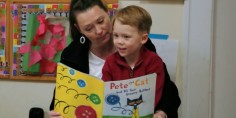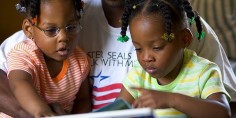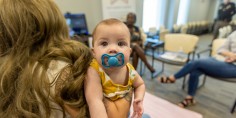“No one was doing this kind of in-home, intensive, early intervention program, and we felt we could really have an impact beyond our residential campus,” says the Rev. Elliot Smith, Thornwell’s president since 2011. “We had a chance to meet needs in the community and help more families become stronger.”
Building Families began in Greenville, Laurens and Richland counties; the Endowment grant supported expansion to Dorchester and Berkeley. It’s unique in that it works in collaboration with local Presbyterian churches, creating community and congregational engagement. Congregations contribute practical support, such as supplying craft materials or space for parenting classes. Building Families offers an opportunity for volunteering and outreach and, most importantly, a lifeline for parents and children.
Signing On
The program helps families address conflicts, communication issues and behavioral problems at school and at home. Parents learn how to teach self-control, set boundaries, give effective consequences and praise effectively. Children learn how to follow instructions, accept “no” for an answer, show respect, and express feelings appropriately.
Family Specialists are trained in the Teaching Family Model, a well-researched approach that focuses on positive behaviors. Thornwell has been using the Teaching Family Model in its residential work for 13 years.
“We started looking at what Thornwell does best, and then considered the services that children and families need that we’re not able to provide though a residential program alone,” Smith says.
With Building Families, the Family Specialists provide two to four months of intensive in-home services through two to three visits each week. They also offer on-call support during especially stressful times, and one year of follow-up services.
Referrals come from pediatricians, therapists, schools and word-of-mouth, but participation is voluntary.
“It takes a lot of commitment from families to say, ‘Yes, we want to do this,’” says Sonya O’Neal, Thornwell’s vice president for programs and clinical services. “In the beginning, our attrition rate was fairly high. But now we’re doing a better job of helping parents make an informed decision about expectations and what they’re getting into.”
“It can be very intimidating to let somebody come into your house and really see what happens,” says one mom. “But the first time our Family Specialist came here, she gathered information about us, our kids, and our household dynamic. There was no judgment, and the program was tailored to our specific needs.”







